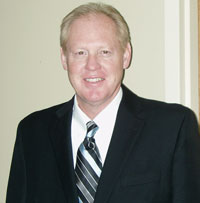Mark Zeigler, D.C., has been the President of Northwestern Health Sciences University since 2006. After graduating from Northwestern College of Chiropractic in 1980, Dr. Zeigler established a private practice in Sturgis, South Dakota. Along with managing a busy chiropractic practice, Dr. Zeigler served as a City Council member in Sturgis from 1982-1996, and as Mayor of Sturgis from 2001-2006.
Dr. Zeigler was appointed to the South Dakota Governor’s Health Care Task Force on Managed Care in July 1995 and was appointed to the Governor’s Public Health Advisory Committee in May 1997. Dr. Zeigler served as president of the South Dakota Chiropractic Association from 1994-1996 and was the South Dakota delegate to the American Chiropractic Association from 1998-2006. Additionally, Dr. Zeigler was named the South Dakota Chiropractors Association Chiropractor of the Year in 1998, and was named the Alumnus of the Year by Northwestern Health Sciences University in 2002. He served on Northwestern’s Board of Trustees from 1996-2006, and was the Board chair from 2004-2006.
Dr. Zeigler and his wife Gae have three adult children, Gabriel, Miaken, and Jonathan. The American Chiropractor (TAC) caught up with Dr. Zeigler (Zeigler) to discuss Northwestern’s role in the educational discipline.
 TAC: Dr. Zeigler, can you tell our readers some of the exciting things that Northwestern has been experiencing?
TAC: Dr. Zeigler, can you tell our readers some of the exciting things that Northwestern has been experiencing?
Zeigler: Let me begin my answer by first thanking The American Chiropractor magazine for giving me this opportunity to tell the chiropractic world about the exciting initiatives currently underway at Northwestern and the goals we have accomplished recently. Obviously, the progress on our “Imagine Our Future” Capital Campaign has been a main reason for many of our accomplishments. Our new 48,000-square-foot addition, the Wolfe-Harris Center for Excellence, was a direct result of the campaign, as was the Standard Process Healing Garden; the Integrity Management Student, Alumni and Career Services Center; and the Foot Levelers Bookstore. Extensive renovations to many of our existing classrooms, including the CDI Radiology Lab and the Integrity Management Smart Center, were also linked to fundraising efforts as part of the Capital Campaign. All of those additions and enhancements to the “bricks and mortar” of our University have provided us with the physical facilities we need to achieve our goal of being the university of choice in natural and integrative health care. Now our job is to provide our students with the educational curriculum they need to succeed as practitioners in a 21st Century health care environment that is rapidly evolving. And that is something we are spending a great deal of effort on enhancing.
TAC: What are you doing to create better educational content?
Zeigler: We believe that it is imperative that we prepare our students for the realities of the emerging health care marketplace, and that we provide them with the tools and clinical models that will help them succeed. With that in mind, we have pushed aggressively in the last several years to develop clinical training models of health care that are evidence-informed, patient-centered, and integrative in nature. And those models need to focus that care on a diverse patient population that mirrors changes in the American demographic landscape. To accomplish that goal, we have reached into diverse communities and to at-risk populations throughout the Twin Cities by providing natural health care in conjunction with respected social service agencies. We have established and successfully grown clinical models that include multiple modalities, ranging from chiropractors to healing touch practitioners. We have implemented an extensive research-focused segment into our curriculum. We are working on establishing a joint clinic with a major medical health care provider in the Twin Cities as a model of how natural and allopathic practitioners can work together. And we continue to look at ways to create even better learning partnerships among the many programs we have on campus. Remember, we were the first natural health care educational institution to pioneer a true university with multiple degree and certificate programs. So we have been working for more than a decade at developing new models of health care delivery. And we intend to continue to be a national leader in this area for the decades ahead.
TAC: How does all of this impact the individual chiropractic student?
Zeigler: Obviously, the better we prepare a student to have the skills necessary to thrive in the health care marketplace, the better we have done our job. But learning is not just memorizing material. Much of what we teach our students is to make choices, based on the knowledge they have learned. So, if you expose a student to a variety of clinical models, and a variety of patient populations, you create a very adaptable future practitioner. If they feel comfortable working with an acupuncturist and a medical doctor, it opens up a whole new world of clinical opportunities for them when they get into practice. The same can be said of our approach to technique classes. Our intent is to provide our students with a deep foundation in adjusting, and then give them access to a broad array of techniques through clubs. By providing choices and access to all of these different disciplines, patients and techniques, we allow each of our students to build a future in health care that mirrors their passion and skills. In that process, we graduate the best doctors possible.
Visit www.nwhealth.edu or call 1-952-888-4777 for more information.
